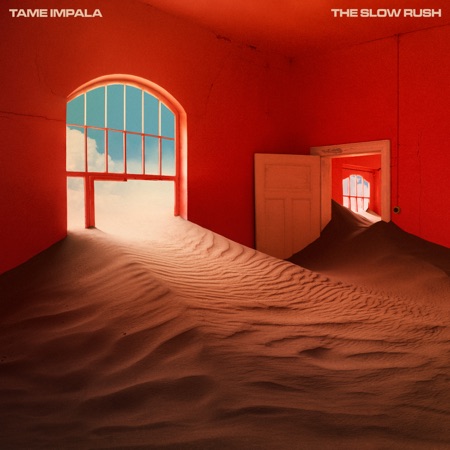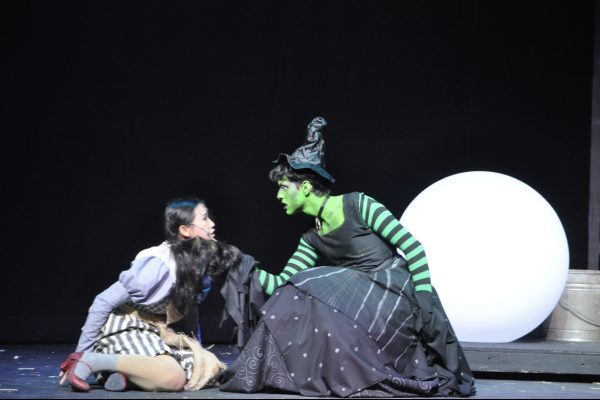Wading mind deep in time: Tame Impala’s insightful new album
Everybody knows the indie personality stereotype — that person who thrifts their clothing, spends all of their time on Twitter and flaunts their “underground” taste in music, including artists like Rex Orange County, Clairo and Frank Ocean (who are actually very popular). Tame Impala, another alternative group, is often mentioned while making fun of this stereotype, invalidating the group’s success. But Kevin Parker (the artist behind the musical venture) produces powerful, well thought-out music that truly deserves the praise the band receives.
Tame Impala’s latest album, “The Slow Rush,” released Feb. 14, explores the theme of time — to which its oxymoronic title refers to — with psychedelic, ‘80s reminiscent beats behind Parker’s lilting vocals, borrowing influence from genres ranging from Latin to Gospel.
The album cover itself is genius: a red bedroom filled with sand that forms ripples and dunes as it spills out of an open door and window. The sand, as if taken from an hourglass, stands for time itself held within the walls of Parker’s bedroom, representing his mind. This buildup could refer to the five-year break between the release of “The Slow Rush” and Tame Impala’s last album, “Currents.” As sand spills out of the window, a source of sunlight is revealed, signifying the relief and clarity of making the album. Parker also carries a theme of waves through his discography; in this album he explores the fluctuation of time in his life.
For the most part, my initial reaction to the album was positive: as a whole, it was an enjoyable listen; a well-crafted tracklist that explored its central concept (time) with incredible depth.
“One More Year”
This album starter is immediately intriguing, with an ominous feel. As the beat comes in, the song gets groovier, very much exhibiting a psychedelic influence. Parker’s vocals are relaxed, as if he has all the time in the world: “We got a whole year/ 52 weeks/ seven days each.” These lyrics show that this song is just the start of a journey, and this album.
“Instant Destiny”
Another oxymoronic title, this is one of the more upbeat tracks, with heavy background synths and high-pitched, almost euphoric vocals. Listening to this song, I get a nostalgic feeling and the simultaneous imagery of spinning in a sunflower field and walking through a city street lit up by neon signs late at night.
“Borderline”
Listening to the lyrics, I realized this song is about confusion and the unknown, both existential concepts lending to the examination of time in the album. The repetition of lines such as, “Will I be known and loved?” and, “Has it been long enough?” emphasize this idea. Parker also expresses a relatable emotional confusion in the track: “We’re on the borderline/ Caught between the tides of pain and rapture.”
“Posthumous Forgiveness”
This song sounds very similar to The Neighbourhood in their most recent album, with a Latin-influenced beat and just the right amount of autotune on the vocals. About halfway into the song, an Arabian melody takes over the track with almost painfully punctuating bass. About four minutes in, the song becomes less affronting, and reveals Parker’s feelings toward, in my interpretation, an absent father: “Wanna tell you about the time/ Wanna tell you about my life.” This song is a cathartic release of repressed pain, for both the artist and listener.
“Breathe Deeper”
This song has a clean feel to it as if a weight has been lifted after the last track. It embraces feminine energy; you can hear the sass in the vocals and lyrics of the chorus: “Believe me, I can.” I can just imagine a confident woman whipping her hair while dancing to this song.
“Tomorrow’s Dust”
Light guitar plucking is soothing at the start, and as the conga drum and bass come in, the song adapts an Afro-Latin feel. But what’s Tame Impala without some synth? Parker skillfully combines music styles in this piece, even bringing in a symphony orchestra toward the end.
“On Track”
The piano at the beginning strikes with such a resonant tone that you immediately feel Parker’s deep sadness. The song goes back and forth between optimism and pessimism, expressing disappointment and frustration with the failure to meet timely goals. It accurately portrays the conflict between acknowledging that you have to move forward and look at the positive but also can’t escape what you feel; that you have to take time to deal with it: “Strictly speaking, I’m still on track/ Strictly speaking, I’m holding back.”
“It Might Be Time”
Dissonant elements including wailing sirens and buzzing speakers combine with a Christmas-like keyboard melody and erratic drum to create an uncomfortable feeling; like the first lyric says, “Something doesn’t feel right.” Parker discusses the discomfort of growing up and losing the ability and desire to live as he did when he was younger, telling himself: “It might be time to face it/ You may as well embrace it.” The track ends abruptly, as his youth may have.
“One More Hour”
This ending track is so rich and powerful, and feels like a reflection on Parker’s artistry and the end of an era. The verses are very vocal-focused, with only a piano backing up Parker’s singing. Ripping electric guitar replaces singing in the “chorus,” the only song on the album that features the instrument. Toward the end, it feels dreamy as Parker reflects fondly and the music fades away.

















